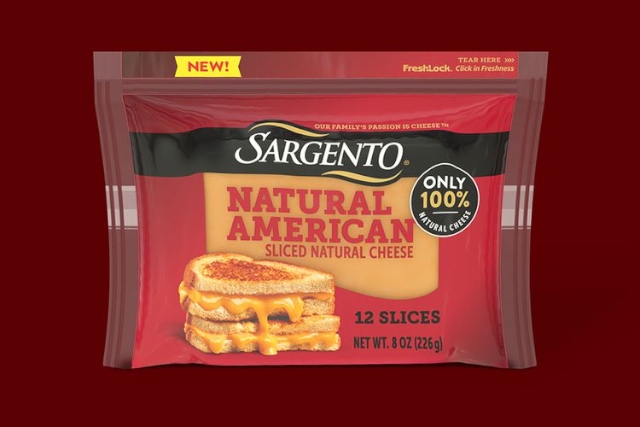It’s about time! As faithful readers will know, I’ve been ranting about so-called ‘American’ Cheese for years. How it’s not ‘real’ cheese. Now, dairy behemoth Sargento is claiming a breakthrough making American Cheese ‘without any additives’!
I’ve been reminding faithful readers for years that so-called ‘American’ cheese is really a highly-processed quasi-food that isn’t even qualified to call itself ‘cheese’ under current government regs…
The problem is, it’s just too darned convenient for families – and too enticingly consistent in colour, flavour and ease of deployment – for today’s busy consumers and restaurateurs to pass up.
A thorn in her side
American Cheese has been a thorn in my side for decades. Sister Erin gets a kick out of shouting at the TV every time the product comes up in shows or commercials. I talk back to the set, as if I could, thereby, remind viewers everywhere, “It’s NOT real cheese!”
As Wikipedia reminds us: The stuff was invented by a pair of Swiss businessmen who wanted to ex-tend the shelf life of real cheese. In 1911, Walter Gerber and Fritz Stettler realized their dream when they tried adding sodium citrate to melted Emmentaler cheese. They found that emulsified cheese sauce thus augmented could be re-cooled into a solid again.
The real hero of the story, though, was Canadian-American businessman J.L. Kraft who popularized this new ‘processed’ cheese after obtaining a patent on it in 1916.
Thanks to Kraft’s chiefly US-based efforts, the stuff quickly became known as ‘American’ Cheese. And oddly – at least in my humble opinion – a thing many Americans are actually proud that one of their invented.
Sargento to the rescue
Today’s American, or Processed cheese is a mish-mash of real cheese, milk solids and, “[a]dditional ingredients, such as vegetable oils, unfermented dairy ingredients, salt, food coloring and sugar.” Overall, processed cheese typically contains around 50 to 60 percent cheese and 40 to 50 percent other ingredients. Conventional wisdom (i.e.- legend and heresay) holds that the cheese component is often made up of packing line trimmings from 100 percent real cheeses, along with other surplus and up-cycled ‘cheese’ content of unspecified provenance.
Sargento has been a leading supplier of real cheese – and processed cheese products – for more than 70 years. It has remained proudly family-owned since its founding in 1953, in Plymouth, Wiscon-sin. And for nearly as long, the company has been pouring research efforts and cash into the search for a ‘better’, more natural processed cheese.
At last, an answer…
Now, Sargento say has it’s come up with a new, ‘natural’ American Cheese. They claim it’s made from the same 5 ingredients as conventional cheese: milk, salt, enzymes, rennet and annatto (a natural ‘orangy’ food coloring from the seeds of the achiote tree).
The method used to make New School American, as they’re calling it, is the key to achieving the desirable characteristics of ‘conventional’ processed cheese. It’s ‘a closely-guarded proprietary secret’. Nevertheless, Saregnto VP of Innovation Rod Hogan claims, “It is made just like natural cheese,” but also “has the melt, taste, and texture that consumers love of American cheese.”
The Sargento method departs from the conventional cheese making routine at the stage when the curds are separated from the whey. No emulsifying agents or ‘intense processing’ are involved. And that’s all Hogan is saying.
My take
Bravo, Sargento! It’s about time someone cared enough to conquer the ‘fake’ cheese challenge!
Hogan says the new product, officially called Sargento Natural American Cheese, will come in reseal-able zip-closure packages, with individual slices separated by parchment paper. More like the consis-tency and texture of real Cheddar. But look for it starting later this year, right next to the other, less- ‘Natural’ American cheese brands in the same part of your supermarket’s cheese case.
~ Maggie J.


